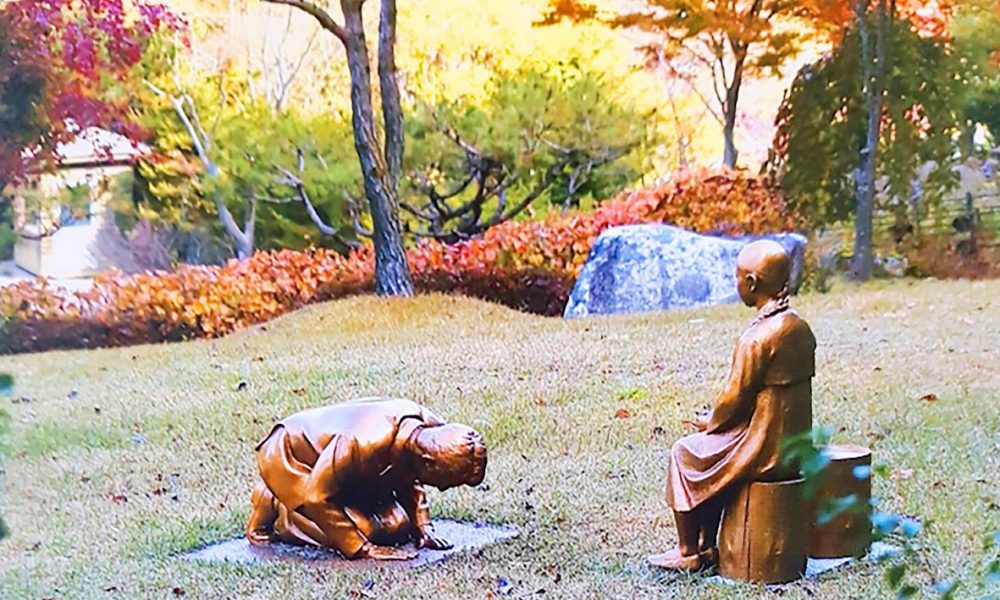A pair of sculptures installed in a South Korean botanic garden are threatening an already shaky relationship between Japan and South Korea. Dubbed “Eternal Atonement”, one of the statues depicts a woman donning traditional South Korean vestments. The other portrays a man on his knees, facing the seated woman with his head touching the ground as if asking for forgiveness.
The statues, owned by Kim Chang-ryeol, are a tribute to the South Korean women who were conscripted to serve in brothels during World War II. Called comfort women, they have long been a bone of contention between the two governments, with South Korea seeking recompense for what happened.
In 2015, in the seeming end of an arduous journey of negotiations, the two countries reached an agreement. Japan publicly apologized for its actions and agreed to provide the funds South Korea asked for to compensate the comfort women and see to their welfare. A few years later, however, South Korea decided to unilaterally terminate the agreement by dismantling the foundation that was tasked to handle the Japanese funds.
Further complications arose when the figurehead of an organization fighting for the cause of the Southern Korean women announced that she would not be taking part in their weekly rallies anymore. Corruption and embezzlement accusations were thrown at the former leader of the organization – an activist turned politician – uncovering years of deception and exploitation.
“Eternal Atonement” only adds fuel to the fire, especially with the idea of the male sculpture representing Japanese Prime Minister Shinzo Abe being thrown around by the local news outlets. The media have been quoting the artist who created the sculptures, who said that the man is indeed a representation of the Prime Minister.
Even the sculptures’ owner, Kim Chang-ryeol, has not categorically denied the resemblance. Instead, in a statement, he declared that it may or may not be the Prime Minister.
Instead, he vaguely stated that “The man could signify any man that has to apologize to the girl. It can be her father or just any man that you could imagine…It is a sculpture who tries to show that forgiving is possible only if Japan continues to ask for atonement until South Korea accepts it.”
However, Kim Chang-ryeol also said that “if that person is Abe, then that would be good.”
The Japanese government’s response was swift and critical. Japan’s chief cabinet secretary, Yoshihide Suga, has said that the statues would have a “decisive impact on Japan-Korea relations.” He also referred to the statues as “unforgivable”.
On South Korea’s part, the foreign ministry stated that they respect international comity but declined to take a public stand on the issue, citing the fact that it is the action of a private citizen.
Whether the responsibility of upholding international comity lies solely on the government or its citizens as well, the fact remains that the statues are inflammatory and disrespectful of a world leader. Some South Korean citizens agree with this, taking to social media to express their dismay.
Considering that the two countries have had a tenuous relationship – with the comfort women being one of the major points – the lack of decisive action on the South Korean government’s part with regard to “Eternal Atonement” is reflective of its sincerity in wanting to resolve the issue. With Japan having publicly apologized several times and having taken concrete steps to provide recompense, it is only logical that they take affront at this latest development.
The path to a strong and positive relationship between the two countries relies on cooperation and mutual respect. Unfortunately, if the South Korean government does not take any steps to contain the aftermath of the statues, it may be all downhill from here. And one can’t really blame the Japanese for their response.

